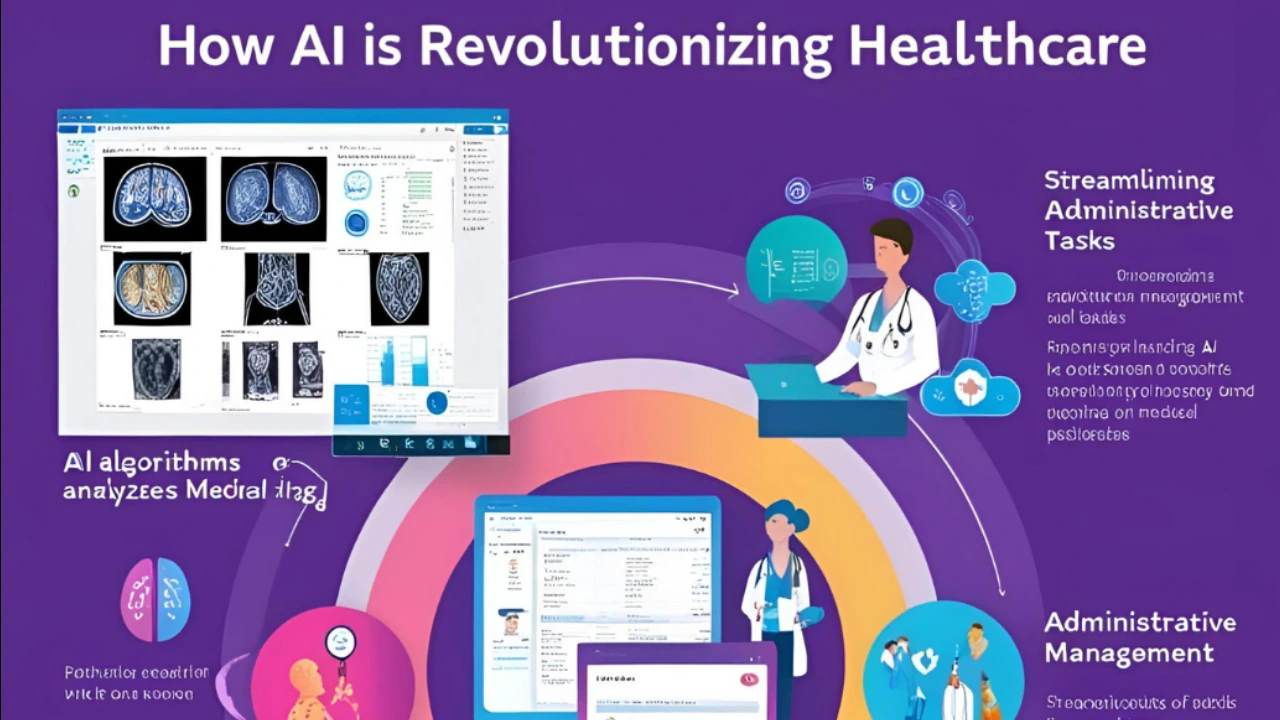As of today How AI is Revolutionizing Healthcare, the main goal of AI in healthcare is to improve patient treatment techniques the primarily utilized of artificial intelligence in medicine to increase speed and accuracy in the healthcare world. Some of the current uses of AI in this field include: Diagnosing Patients and with help of AI algorithms analyze medical imaging data, such as X-rays, MRIs, and CT scans, to assist healthcare professionals in accurate and swift diagnoses.

Artificial intelligence in medicine will enhance the accuracy in patient diagnostics, robotic supports surgeries, and accelerate drug discovery. AI applications in medical science also improve outcomes, reduce costs and transform the future of global healthcare systems.
AI in Medical Diagnostics: Enhancing Accuracy and Early Disease Detection
AI in Medical Diagnostics algorithm can analyze huge amounts of medical data, including imaging scans, lab results, and patient records, with greater precision than traditional methods and AI also assist nurse and doctors in making improvement in diagnoses by studying patient histories, lab results, and genetic information. AI in diagnostic enhances accuracy and also enables personalized treatment planning for the patient.
This cutting-edge technology Enhancing Accuracy and Early Disease Detection and reshaping the future of diagnostics and paving the way for more proactive healthcare solutions.
The Future of Surgery: Exploring AI-Powered Robotic Procedures
Artificial Intelligence (AI-Powered Robotic Procedures) in modern medicine will enhance precision, reducing human error made in surgery, and enabling minimally invasive procedures with improved patient outcomes. AI-assisted surgical procedures allow for best accuracy in complex operations, including cardiovascular, orthopedic, and neurological surgeries.
AI-Powered Robotic Surgery Systems will be guided by the AI and resulting in shorter recovery times and less pain for patients admitted in hospital. AI-Powered Robotic Surgery Systems continue to evolve, safer, faster, more effective surgeries and setting a new standard for excellence in modern medical practice.
Personalized Medicine and AI: Tailoring Treatments for Better Outcomes
AI facilitates precision medicine by analyze a patient’s medical history, genetic information, and other relevant data to generate personalized treatment plans. AI in personalized medicine can help healthcare providers like nurse, doctor and pharmacist tailor treatment plans, predict outcomes with greater accuracy with its ability to analyze large datasets, identify patterns of patents, and predict the outcomes. These AI-driven healthcare solutions enable real-time adjustments to treatment plans, ensuring optimal care throughout a patient’s journey.
AI in Drug Discovery: Accelerating the Development of New Medications
AI in Drug Discovery accelerating the development of new medications by improving efficiency, reducing costs & fostering innovation, transforming pharma sector by reducing the time from years to months by streamlining big data analysis and using AI algorithm. With AI for new drug development, researchers can simulate clinical trials, uncover novel compounds, and re-purpose existing drugs more efficiently. Here are five key benefits of AI in drug discovery:
- Faster Drug Development
- Cost Efficiency
- Improved Accuracy
- Drug Repurposing
- Predictive Modeling
Also Read: Effects of Sleep Deficiency on Human Health
FAQ – How AI is Revolutionizing Healthcare
Does AI speed up drug discovery?
AI quickly analyzes data to identify potential drugs, making development faster — accelerating time-to-market.
Will AI reduce the cost of developing new drugs?
Yes, AI cuts unnecessary trials and streamlines research — saving significant costs.
AI more accurate in predicting drug success?
AI improves accuracy by modeling complex biological interactions — enhancing reliability.
How AI find new uses for existing drugs?
Absolutely, AI helps repurpose known drugs — maximizing their value.
How AI will assist in clinical trial predictions?
Yes, AI models outcomes before trials begin — reducing risks and improving planning.
Conclusion
AI is transforming drug discovery by making it faster, cheaper, and more accurate, ultimately leading to better and more efficient healthcare solutions. With AI for new drug development, researchers can simulate clinical trials, uncover novel compounds, and re-purpose existing drugs more efficiently




